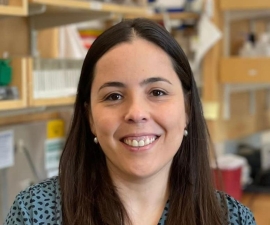

Research Bio
Ana Paula Arruda is an assistant professor in the Department of Nutritional Science & Toxicology.
Metabolic adaptation in response to nutritional fluctuations is essential to maintain organismal homeostasis. Many processes supporting metabolic adaptation to transient changes in nutrient availability occur at the level of intracellular organelles such as the endoplasmic reticulum (ER).
The ER controls essential processes in the cells such as protein translation, folding and secretion, lipid biosynthesis, glucose metabolism and is the main site of Ca2+ storage in the cells. ER structure is complex and comprises a network of interconnected membranes organized as flat sheets and tubules which maintain physical contact sites with every other organelle in the cell. ER structure and function are highly dynamic especially in metabolic cells such as liver and intestine, that completely shift metabolism during nutritional changes such as in fasting and feeding. However, ER fails to adapt to chronic metabolic stress imposed by obesity and metabolic syndrome. ER dysfunction in obesity is one of the pivotal mechanisms associated with obesity-driven metabolic diseases such as insulin resistance, diabetes, atherosclerosis and fatty liver disease, which are major public health problems worldwide.
Her research lab found that in liver, obesity leads to major intracellular architectural remodeling of the endoplasmic reticulum characterized by the loss of ER sheets and increase of ER tubules, which is associated with decreased ER folding capacity, unbalanced lipogenesis and stress. They also found that obesity leads to key alterations in the ER’s physical contact sites with mitochondria and plasma membrane, which result in a widespread problem in Ca2+ signaling in the cell.
Research in Arruda lab aims to understand how remodeling of the ER structure and contact sites with other organelles translate in alterations in metabolic regulation during nutritional fluctuations in physiology and metabolic diseases.
